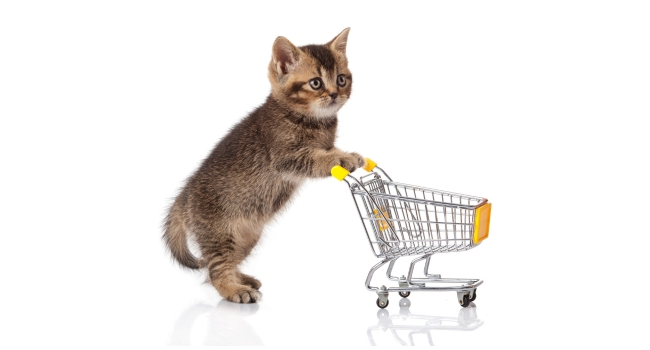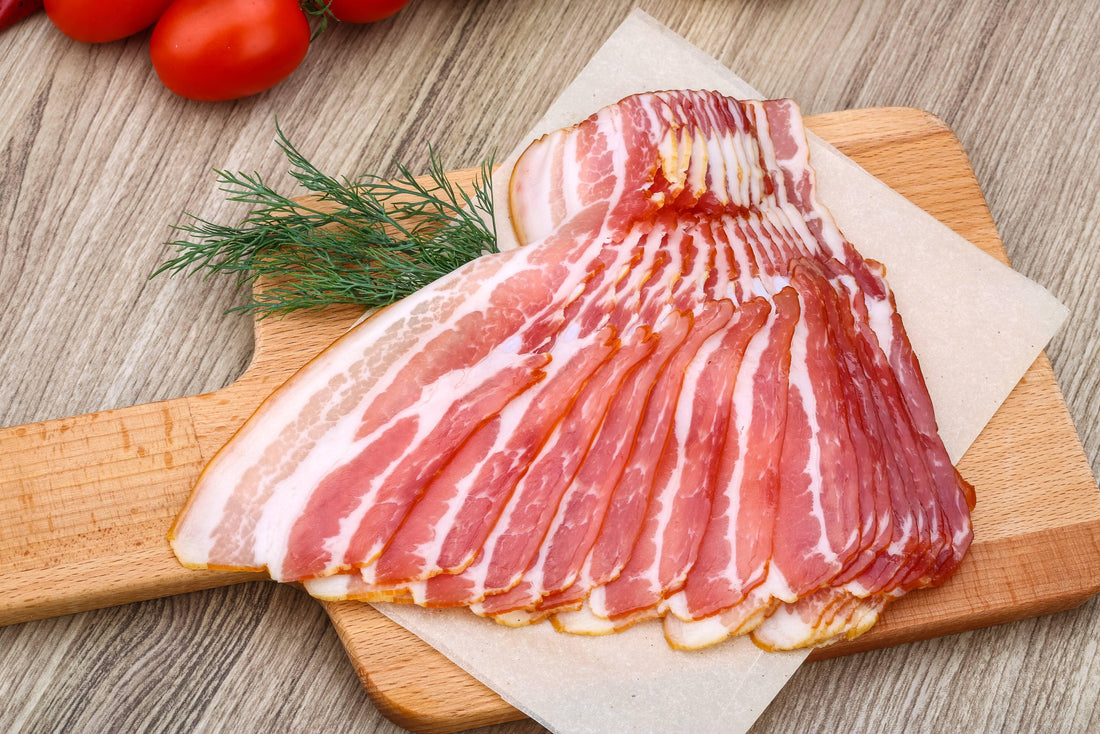If you're a cat owner, you probably already know that cats have different nutritional needs than humans do and this means your cat can't eat the same things you do! This is because some human food might do more harm than good for your cat.
So the question is: Can cats eat bacon?
The answer to this question, however, isn’t as simple as it seems because there are many different factors to take into consideration before you can safely feed your cat some bacon.
Read on to find out more!
Can Cats Eat Bacon?
The truth is, in some cases, yes...but with many caveats!
Most veterinarians agree that bacon is not toxic to cats and it is technically safe for them to eat in small amounts.
However, it is not recommended to give bacon as a steady diet as it can have some long-term health effects.
Bacon can be given sparingly and in moderation to felines as a treat, but it shouldn't be their main food source or the only thing they eat every day.
What Makes Bacon Bad for Cats?
Salt Concentration
Because bacon is cured, it contains a lot of salt. Excessive amounts of sodium can cause issues with your pet's kidneys and heart.
Fat Level
The high amount of fat in bacon makes it hard to digest, and cats are more susceptible to pancreatitis than human beings. This disease is painful and often deadly; it affects both humans and animals.
High Calories
Just like humans, cats need a balanced amount of calories each day. Feeding them too much bacon can lead to certain health problems.
High Protein
Bacon is bad for cats because it contains too much protein. It can cause kidney failure and high blood pressure in felines.
Preservatives
Bacon contains preservatives like potassium nitrite and sodium nitrite, which can be harmful to your pet. If you give bacon to your pet regularly, it might lead to an irregular heartbeat.
The moral here? Don't overdo it!
Can Cats Eat Turkey Bacon?
Some pet owners are under the impression that turkey bacon is a healthier alternative to pork bacon for their furry companions.
But the fact is that there isn't much of a difference in terms of sodium and fat content, and it often contains preservatives as well.
However, turkey bacon can be fed to your pet in small amounts occasionally. But it doesn't make it any better than pork bacon when it comes to overall health benefits for your pet.
Is it Safe for Cats to Eat Bacon Bits?
When it comes to feeding your pet, it is always a good idea to avoid giving them food that is high in sodium. Bacon bits are no exception and can be harmful to your furry friend if given regularly.
Bacon bits are loaded with sodium, which can lead to health issues like hypertension and heart disease in felines.
Furthermore, bacon bits are processed food and not a healthy meal for your cat. Always make sure to provide your furry companion with nutritious and healthy meals and snacks!
Can Cats Eat Raw Bacon?

Some pet owners may be tempted to feed their domesticated cats raw bacon because it sounds like a tasty treat.
However, it is generally good to be cautious and never feed any raw pork products to your cat because raw bacon can contain harmful bacteria and parasites that can lead to infections in the stomach and intestinal tract.
In addition, the digestive system of domesticated cats is very sensitive which makes them prone to the effects of these bacteria and parasites in raw bacon.
While consuming raw bacon can lead to various health risks but the following two infections are especially dangerous:
- Listeriosis
- Salmonellosis
Listeriosis
Raw bacon can also be contaminated with Listeria, causing Listeriosis. The symptoms vary depending on the severity of the disease, which can be anywhere from mild to severe.
Some signs of a mild case include:
- Lethargy
- Fever
- Diarrhea
- Nausea
If it progresses further, it can develop into muscle pain, breathing issues, pregnancy complications, or even death.
Salmonellosis
Raw bacon can contain Salmonella which can cause severe gastrointestinal problems in cats. Your cat may experience the following symptoms if it eats raw bacon containing Salmonella:
- Fever
- Loss of appetite
- Vomiting
- Diarrhea
- Dehydration
- Weight loss
Cats with any of the above symptoms should be taken to the vet as soon as possible and should not be eating anything before the examination.
Are Cats Able to Eat Bacon Grease?
While bacon grease is a tasty treat for many of us, it is not good for a cat's health. Bacon grease contains plenty of fats and sodium which are harmful to cats.
Some pet owners pour bacon grease over their pet's dry food or mix it into wet food, but this would not be recommended without consulting your veterinarian first.
Cats Can Eat Bacon as a Regular Treat?
It's advised that cats occasionally eat bacon, but in only small doses. Bacon is a tasty snack for cats because it is high in protein and other nutrients like selenium and choline.
However, bacon can also contain fats and sodium which can make your cat sick if it eats too much of it. A little bit of bacon now and then will not harm your pet though!
How Much Can a Cat Eat Bacon?
According to veterinarians, only 4 -10% of your furry friend's daily diet should consist of treats. If you're cooking bacon at home and want to share it with your kitty, cut off a small piece and give it to them as a special treat. Just make sure they can't reach any uncooked bacon!

How often a cat eats bacon depends on several factors such as age, health, and diet. A piece of bacon once a week is OK for most cats.
However, it’s important to remember that bacon is a cured meat and therefore high in sodium. It may also contain additives that are not suitable for pets.
If you notice any negative changes in your pet’s behavior after feeding him or her a small amount of bacon then avoid giving them anymore.
Your vet may be able to recommend alternatives if you want to give your kitty an occasional treat!
Is There Any Serious Health Condition That a Cat May Develop if it Eats too Much Bacon?
Some cats can’t handle bacon. It’s true! So it’s important to pay attention to your feline friend’s health if you decide to give them bacon as a treat.
Eating too much bacon can cause the following problems:
- Obesity
- Salt Poisoning
- Feline Hypertension
- Digestive Stress
- Pancreatitis
- Severe Dehydration
Obesity
Obesity in cats is a growing problem. Cats that eat too much bacon can experience health problems, including obesity and an increased risk of heart disease and renal problems. Keep your feline friends safe by preventing them from eating any bacon.
Salt Poisoning
The salt content of bacon is extremely high, so even small amounts could lead to life-threatening salt poisoning in cats. Consuming too much salty food may cause the following health issues for your cat:
- Hyperactivity
- Rapid Breathing
- Vomiting
- Excessive Thirst
- Diarrhea
- Lethargy
- Tremors
- Seizures
- Lack of Coordination
- Coma
In severe cases, salt poisoning can lead to death. If you think your pet has eaten too much bacon, contact your veterinarian immediately!
Feline Hypertension
Feline hypertension is a serious condition that requires immediate attention and treatment. Like humans, some cats can develop high blood pressure from eating too much bacon.
There are two types of hypertension:
- Primary
- Secondary
Primary hypertension is most common and can be caused by any one of several factors such as obesity or salty food while secondary hypertension is rarer, more dangerous, and often caused by an underlying medical condition or renal disease.
Digestive Stress
Bacon contains a significant amount of salt, fat, and nitrites (due to its curing process) which can lead to digestive problems in cats when too much is consumed. Ingestion of large amounts of these ingredients can cause:
- Vomiting
- Diarrhea
- Lethargy
- Weakness
- Dehydration
- Loss of appetite
- Abdominal pain
Pancreatitis
Pancreatitis occurs when your pancreas becomes inflamed and stops working the way it should, which makes your pet quite sick.
Fatty foods such as bacon have been found to be the leading cause of pancreatitis in cats. This is because the pancreas is overworked trying to process all nutrients, which can result in inflammation.
Severe Dehydration
The most severe effect of feeding bacon to a cat is dehydration. The high salt content dehydrates your kitty’s body by pulling water from body cells and potentially leading to shock or worse.
Symptoms of dehydration in cats include:
- Profuse Drooling
- Drowsiness
- Sunken Eyes
- Lethargy
- Dry Skin and Gums
- Constipation
- Loss of Appetite
Call your vet immediately if you notice these symptoms in your pet. Dehydration is a serious business; please don’t wait before seeking veterinary help!
What to Do if Your Cats Show Symptoms?

If your cat shows any of the above-mentioned symptoms, you should take them to a veterinarian right away.
The vet will help you figure out how much bacon your cat has eaten and what other issues should be addressed.
To find out the level of sodium poisoning, cholesterol, and so on, the vet will do a physical examination and lab tests.
He or she might conduct some or all of the following tests:
- Physical examination
- Chemical blood profile
- Complete blood count
- Electrocardiography (ECG)
- Urinalysis
Are There Any Healthier Alternatives to Bacon?
Protein snacks like small bits of cooked chicken or a small serving of tuna will provide your cat with nutritional benefits without any risk.
There are a lot of protein snacks available to choose from:
- Tuna
- Chicken
- Cooked eggs
- Sardines
- Lean beef
- Lamb
- Shrimps and prawns
- Salmon
- Mackerel
What Other Foods Should I Avoid Feeding My Cat?
For people that want to share their food with their cat, make sure to give your cat healthy human snacks instead of snacks that may harm them.
Foods you should avoid giving your cat include:
- Alcohol
- Citrus fruits
- Coffee
- Coconut
- Grapes and raisins
- Dairy products
- Mushrooms
- Raw bread containing yeast
- Onions, garlic, leeks, chives, scallions, and shallots
Key Takeaways
- You can give your cat bacon as a treat, but only in small amounts.
- Bacon may cause more harm than good, so it's better to avoid it.
- Overeating bacon can cause digestive problems, obesity, renal problems, and heart disease.
- Always consult your veterinarian before giving your cat any new food.
Pro Tip:
It can be very stressful and concerning when a beloved pet is not feeling well, so it's worth it to get pet insurance to make sure you can cover the veterinary bills.
Importance of Pet Insurance
Pet insurance is a great way to protect your animal's health. It can be hard to predict when an accident will happen, but with pet insurance, you're covered.
There are a few different types of plans depending on your needs, and it only takes minutes to get coverage for your pet.
Some pet insurance companies will even cover 100% of veterinary expenses. So make sure to choose the best pet insurance plan for your furry friend.
Once you have a plan in place, vet bills will never be too high because they'll already be covered by the policy.
It's important that we all take care of our animals' safety and well-being so they can enjoy their lives just as much as we do ours.
What Makes Genius Litter Different from Ordinary Litter?

Say goodbye to hauling heavy bags and hello to easy Genius Litter.
With our innovative non-clumping litter formula, you'll need less of it. One bag of our disposable Genius Litter lasts up to a month, so you won't need to refill the box as often and can save money on monthly costs.
One thing that separates us from traditional litter is that Genius Litter changes color to indicate when your cat has a potential health issue, so you can get them help before it becomes an urgent medical situation.
All you need to do is set up a delivery date with us each month, and rest easy knowing that Genius Litter will arrive at your doorstep every 30 days.
For a convenient solution for your cat, try Genius Litter today!
Why is Lysine so Important for Your Pet?

Protect your pet's immunity!
Have you noticed that your cat is coughing, sneezing, and having rapid breathing? Or maybe he/she has been scratching more than usual?
These are all signs of a weakened immune system. One way to prevent this from happening is by using lysine supplements.
Lysine plays a key role in your pet's immunity because it helps to regulate the immune system.
Without enough lysine, your pets will be more susceptible to illness because their immune system can't fight off infections as efficiently.
When they are sick, they will also be less able to absorb nutrients and make use of other supplements that can help them feel better.
Give your pet the support they need. Our Lysine supplement provides essential amino acids to help support a strong immune system.
Order now to get 300 one-scoop servings or 150 two-scoop servings and don't worry about expiry!





